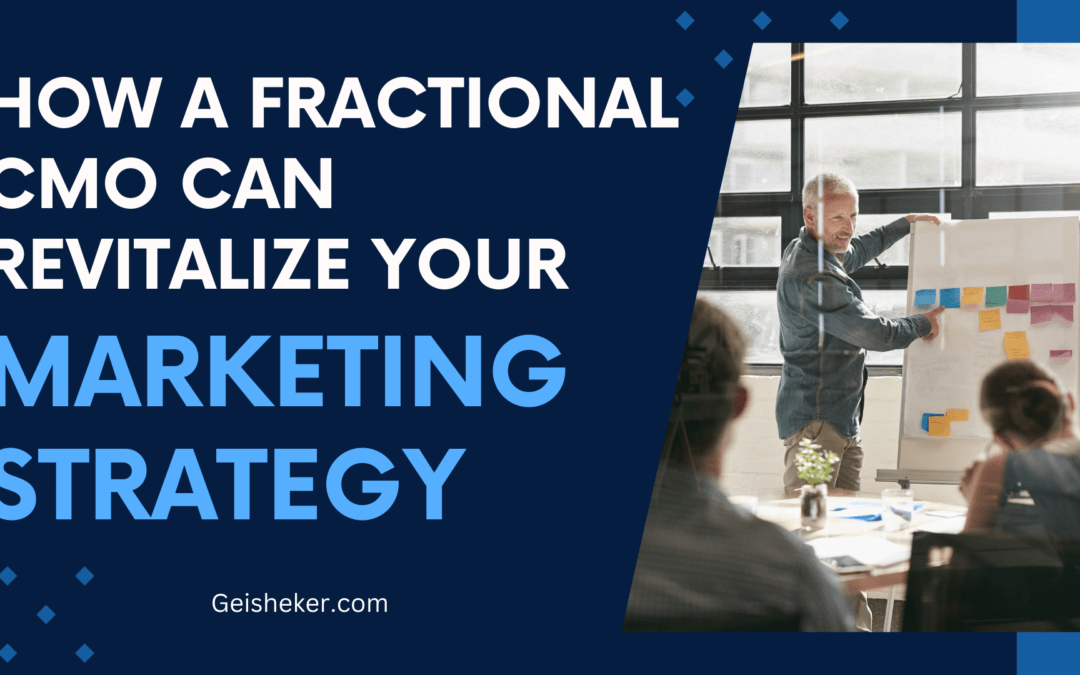Many small and medium-sized businesses struggle with their marketing. They know they need to do marketing to attract customers and grow their business but often don’t have the budget or resources to hire a full-time Chief Marketing Officer (CMO). This is where working with a fractional CMO can help.
What is a Fractional CMO?
A fractional CMO is someone who works as your part-time marketing leader. They have all the strategic experience and skills of a full-time CMO, but you only pay for the amount of time you need them, like 5-30 hours per week. This makes hiring a high-level marketing strategist affordable for growing companies.
The fractional CMO plugs into your company on a retained basis to help plan, guide, manage, and execute your marketing. Think of them as your “outsourced CMO.” Their role can be as focused or broad as you need to achieve your growth goals.
The Many Benefits of Hiring a Fractional CMO
There are many advantages to hiring a fractional Chief Marketing Officer rather than trying to do all your marketing in-house or hiring a marketing agency.
1. Objective Outside Perspective
An experienced fractional CMO has seen highly effective and ineffective marketing across many companies. This gives them an expert outside perspective to objectively assess and optimize your marketing strategy without any personal agenda or bias. They can quickly spot gaps and opportunities for improvement.
2. Diverse Marketing Expertise
An accomplished fractional CMO has expertise across multiple marketing disciplines – market research, branding, messaging, product marketing, pricing, sales enablement, advertising, external communications, PR, and more. This saves you from trying to be an expert in all aspects of marketing or hiring multiple specialists.
3. Senior-Level Strategic Thinking
The fractional CMO brings senior-level marketing leadership, strategic thinking, and rigor to your marketing planning and execution. This ensures your marketing is targeted for optimal return on investment and tied directly to crucial revenue goals. You benefit from C-suite marketing leadership without the cost of a full-time executive.
4. Flexible, Affordable Model
The part-time, fractional model allows you to pay for the marketing leadership and expertise you need tailored to your budget. You aren’t paying extra for a full-time resource when you may not require it. And you scale up or down based on changing marketing and growth needs.
5. Frees Up Internal Resources
Having a fractional marketing leader on board frees up any marketing employee or executive team resources you do have. Your existing team can offload strategic planning and decision-making while focusing more on tactical execution and operations. This also frequently endows them with new expertise and skills.
How a Fractional CMO Revitalizes Marketing
An experienced fractional Chief Marketing Officer makes an impact on an organization’s marketing in multiple ways. Here are some of the key improvements they can spearhead to revitalize marketing and drive business growth.
1. A Fractional CMO Sets Proper Targeting and Goals
One of the first things an outside fractional marketing leader addresses is ensuring your messaging, offers, and spending are tightly targeted and optimized for your ideal customer profile. They will also set or refine your marketing key performance indicators and goals to be data-driven and tie directly to key business objectives like revenue growth, market share gain, new customer acquisition cost, etc. Proper targeting and goals set the stage for impactful marketing.
2. Optimizes Your Brand Positioning
Your brand positioning and messaging must resonate with your ideal buyer if you want to motivate a purchase. An unbiased fractional CMO will evaluate your branding and messaging against buyer needs and how you differentiate yourself from competitors. They’ll refine and optimize branding and external communications to attract and engage the right customers.
3. Improves Your Understanding of Buyer Needs
Better grasping customer needs, pain points, and buyer journeys are invaluable for marketing success. A data-driven fractional marketing leader will spearhead marketing research initiatives like surveys, interviews, and focus groups to strengthen your customer insight. They’ll use this information to craft marketing content, offers, and experiences more tailored to buyer needs.
4. Mines Existing Data and Tools
Often, companies have extensive unused data on current customers and marketing performance but lack resources to mine the data for insight. An analytically skilled fractional Chief Marketing Officer will rigorously assess existing data and digital tools to spot trends, opportunities, and baseline performance to refine strategies and tactics, target prospective customers, and inform spending decisions.
5. Optimizes Your Marketing Mix
There are many potential marketing channels and tactics to choose from today – digital, traditional, content, social, events, etc. An experienced fractional CMO looks outside your current marketing mix – where and how much you are spending by channel – to optimize it based on your goals, audience media consumption habits, and return on investment.
6. Improves Campaign Performance
With an objective eye and expertise in executing hundreds of campaigns, an accomplished fractional marketing leader critically evaluates the design, execution, and performance of all your marketing campaigns. They will tweak and optimize campaign creativity, offers, and delivery based on data and experience to lift campaign key performance indicators – response rates, conversion rates, customer acquisition cost, lifetime value, and more.
7. Builds Consensus and Buy-In
It is critical to get internal consensus and buy-in across the leadership team and organization on the right marketing strategies and resources to execute them. A fractional CMO is an influential team leader and evangelist for marketing priorities and activities. Their authority and expertise build convictions and alignment on marketing plans, leading to more significant investment and better results.
8. Adds Strategic Rigor and Accountability
A CMO-level fractional marketing leader will bring much greater strategic rigor, analysis, accountability, and discipline to all aspects of your marketing planning and operations. You benefit from strategic frameworks, established processes, best practices, and reporting cadences that are hallmarks of experienced C-level marketing leadership.
What to Look for in a Fractional CMO
As you evaluate prospective fractional Chief Marketing Officers, make sure to assess some key factors to ensure an optimal partnership:
- Deep expertise in your specific market and/or industry category
- Tangible experience planning and leading highly effective marketing organizations and initiatives
- Strong strategic thinking, analytical, and leadership capabilities
- Testing and optimization discipline using data to drive decisions
- Award-winning creative development and campaign execution track record
- Exceptional communicator and presenter to build buy-in across the organization
- Commitment to transparency, accountability, and results
The Takeaway
Hiring an accomplished fractional Chief Marketing Officer allows growing businesses to tap into senior-level marketing expertise and leadership that are typically unaffordable. With an expert fractional CMO guiding your marketing, you benefit from strategically optimized branding, messaging, segmentation, research, campaign development, spending mix, and execution tied directly to business growth KPIs. You only pay for the marketing leadership you need while gaining an invaluable ally to drive marketing performance, outpace competitors, and hit aggressive growth targets.
Hire a Leading B2B SaaS Fractional Chief Marketing Officer
If your company needs a B2B SaaS fractional Chief Marketing Officer, consider working with Peter Geisheker. Peter has been providing Fractional CMO services for over 20 years and has expertise in growth tactics and conversion optimization. View Peter’s Fractional CMO case studies.


